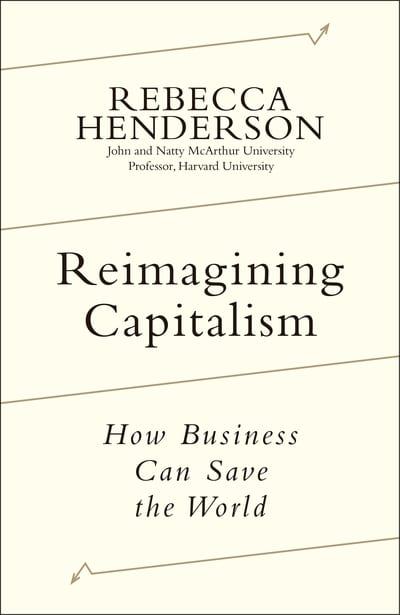
Reimagining Capitalism: How business can save the world is a very didactic, easy to read book. Unfolding like a captivating lecture, it is highly structured and each point is illustrated with a wealth of business examples taken from a wide spectrum of enterprises, old and new.
You can easily imagine Rebecca Henderson on the campus of the Harvard Business School answering the challenging questions of Millennials who fully embrace sustainability and inclusion topics. The resulting book challenges head-on the paradigm of business management theory over the last fifty years that held shareholder value maximisation as the most powerful way to increase general prosperity. She does not seek to list the shortcomings or fix the problems of the current model, rather, she is more ambitious. Tapping into her considerable experience of business consultancy and her knowledge of history of corporations and national institutions, she builds block by block a path to rethink or Reimagine Capitalism.
She takes stock of Shareholder Value Maximisation theory and highlights that the conditions deemed necessary by its early advocates are not always present: markets fail us because externalities are not properly priced, genuine freedom of opportunity is not available to many because of lack of fair access to education and health services and firms are increasingly able to fix the rules of the game in their favour. Uncontrolled free markets lead people to believe that they can do without government, “without shared social and moral commitments to the health of the entire society” on which however all market activity ultimately relies.
In her effort to build a path to “reimagine capitalism in practice”, she lays out five foundation blocks to lead us on the journey.
Firstly, she tackles the strong economic business case for creating shared value. It is somewhat abstract and ethereal as a theoretical economic concept, however, she effectively uses examples to illustrate how it can manifest itself and its importance in a business context. Reducing environmental damage and treating people well reduce reputational risk. Shared value can also help securing the long-term viability of a supply chain, increase the demand for your product and reduce costs. Achieving shared value however, is not a small feat. To help us project how shared value can be established in a company, she introduces the interesting concept of architectural innovation.
Following this logic, she highlights how the adoption by any enterprise of an authentic purpose “makes it easier to identify the kind of architectural innovations that enable the creation of shared value.” Rejecting the commonly held belief of profits and purpose being mutually exclusive, she sees purpose-driven organisations as better equipped to handle transition in disruptive market conditions. The clear sense of their mission in the world, the commitment to building an organisation in which every employee is treated with dignity and respect “release creativity, commitment and raw energy”. She does not elaborate much on the strong spiritual or political convictions that sustain “the courage and vision of the leaders necessary to manage with purpose” even though she recognises its critical importance.
She then turns her attention to the need for finance to focus on the long-term. Asset owners and asset managers might have a different appetite (and incentives) to hold assets long-term but investors in general need better data to be convinced to hold their interest longer. ESG metrics, especially those with potential significant impact on short-term profitability and long-term liabilities must continue to be rigorously developed and used. While the investment community as a whole may not yet be ready to wholeheartedly embrace the company purpose and ready to give time to its implementation, Rebecca Henderson suggests a possible limitation, even reduction of investor power to the benefit of other stakeholders. Harnessing the power and influence of investors is a key enabler to drive change at scale. The examples she cites demonstrate that this is beginning to happen within the investment community.
However, one company cannot do much on its own about genuine public good problems. Industry-wide self-regulation has been criticised in the past as a way to anticipate and diffuse the threat of government regulations or also to set up barriers to new entrants. Nevertheless, the powerful example of how Unilever and Paul Polman socialized the problem of palm oil sustainability shows that increasing everyone’s incentive to cooperate and being able to enforce cooperation can have a major impact and create collective shared value.
Her last avenue of reflection in Reimagining Capitalism is the role of government as a guarantor and enabler of a free and fair market. “While economic growth and social well-being are often enormously advanced by the presence of free markets, they are also critically dependent on a host of complementary institutions.” Denouncing the systematic campaign of the last 50 years to discredit government in the US, she suggests answers to the fundamental question she raises namely “how do we protect the institutions that have made us rich and free?”
Rebecca Henderson is determined to provide each reader with nothing less than a roadmap to find their own path forward towards changing the world. She is a staunch believer in the positive power of capitalism but is also clear about the dangers of unchecked capitalism, leading to the explosion of inequalities and the raise of populism. While the topics she develops could have justified further ethical considerations, she keeps the debate firmly in the logic of the business case, adopting a rigorous, business-like approach. She manages nevertheless to communicate and share a real passion for the issue at stake. This book is highly topical as demonstrated by the speech on March 15 2021, by the acting chair of the US Securities and Exchange Commission, Allison Lee who stated:
“That supposed distinction—between what’s ‘good’ and what’s profitable, between what’s sustainable environmentally and what’s sustainable economically, between acting in pursuit of the public interest and acting to maximize the bottom line—is increasingly diminished,” Lee told the audience at the liberal think tank Centre for American Progress. “[There’s] no historical precedent for the magnitude of the shift in investor focus that we’ve witnessed over the last decade.”
It is overall a very interesting and relevant book, well worth reading and reflecting upon.
“Reimagining Capitalism: How business can save the world” by Rebecca Henderson was published in 2020 by Portfolio Penguin (ISBN-13: 978-0241379660). 336pp.
 Anne Devlin is a director of Terra Solar II, a former oil trader with BP and a member of the Board of CEME.
Anne Devlin is a director of Terra Solar II, a former oil trader with BP and a member of the Board of CEME.